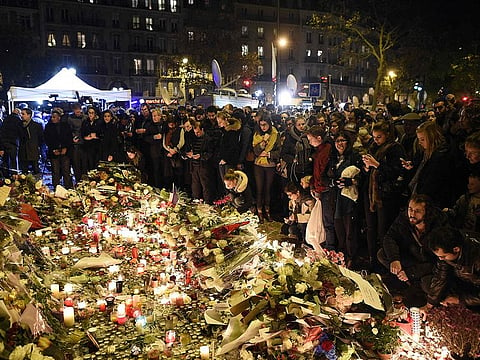Paris court to issue verdicts after marathon 2015 attacks trial
Attention will focus on the sole surviving member of Daesh who laid siege to the capital

Paris: After the biggest trial in modern French history, judges are set to hand down verdicts on Wednesday to 20 men accused over the November 2015 Paris attacks that left 130 people dead.
The much-awaited end to the court case, which began in September 2021, will cap nine months of hearings and a six-year, multi-country investigation whose findings run to more than a million pages.
Attention will focus on the sole surviving member of the team of Daesh group who laid siege to the French capital, attacking the national sports stadium, bars and the Bataclan concert hall on a Friday evening.
Salah Abdeslam, 32, was captured by police four months after the bloodbath, having discarded his suicide belt on the night of the attack and fled back to his hometown, Brussels.
"I went to prison at the age of 26. I'm not perfect, I made mistakes, it's true. But I'm not a murderer, I'm not a killer," he said.
"If you convict me for murder, you will be committing an injustice," added the Frenchman of Moroccan origin in his final statement to the specially built room at the historic court complex in central Paris.
Having started out admitting to being a Daesh fighter, the former pot-smoking party lover has sought to convince the court that he declined to detonate himself "out of humanity".
The court has heard how his belt was actually defective and that he wrote afterwards about his regret for not taking part.
Prosecutors have condemned his tearful apologies and pleas for clemency before the five judges as a cynical ploy to avoid a full-life term, which prosecutors have demanded.
Full-life sentences, which offer a small chance of parole after 30 years, have been pronounced only four times since being created in 1994.
"Those who committed these heinous crimes are nothing more than lowlife terrorists and criminals," prosecutor Nicolas Le Bris said in mid-June in his closing statement.
Trauma
The November 2015 attacks deeply traumatised France, with the choice of targets - music and sports venues, the capital's famed bars and cafes - and the manner of the violence seemingly designed to inflict maximum shock.
In one instance, the court heard a recording of gunmen taunting people trapped in the Bataclan as they fired on them with Kalashnikov machine guns from a balcony above.
The massive loss of life marked the start of a gruesome and violent period in Europe, as Daesh claimed numerous attacks across the continent, leading Paris to ramp up its military campaign to defeat the extremists in Syria and Iraq.
The verdict "will not heal the wounds, visible or invisible. It won't bring the dead back to life, but it will at least assure that, here, it's justice and the rule of law which has the final word", another prosecutor, Camille Hennetier, said earlier this month.
In the absence of the rest of the attackers - nine out of 10 blew themselves up or were killed by police - the men on trial besides Abdeslam are suspected of offering logistical support or plotting other attacks.
One of them, Mohamed Abrini, has admitted to driving some of the Paris attackers to the capital and explained how he was meant to take part but backed out.
The 37-year-old also started out justifying Daesh violence as part of a fight against Western countries, but ended by apologising to victims in the final stages.
"I'm aware that what happened is disgusting," said the childhood friend of Abdeslam set to go on trial for separate attacks in Brussels in 2016, where he is suspected of pushing a bomb-laden trolley into the city's main airport.
Six of the 20 people on trial in Paris are missing, including the overall commander, senior Syria-based Daesh figure Oussama Atar, who is presumed dead.
Therapy
Many of the 149 days of hearings since September have been given over to testimony from survivors and victims, lending proceedings at times the sense of a mass therapy session that has offered comfort to many participants.
"When you take part, you hear about everyone else's stories, what they suffered, what they lost," David Fritz Goeppinger, a hostage in the Bataclan, told AFP recently.
Arthur Denouveaux, head of the Life for Paris survivors' group, said that after nine gruelling months, people were ready for the end.
"I'm not that interested in the verdicts in themselves. It's really about saying 'that's it. It's behind us. The justice system has done its work, we can move on'," he told AFP.
The verdicts are expected from 5:00 pm (1500 GMT).
Sign up for the Daily Briefing
Get the latest news and updates straight to your inbox







